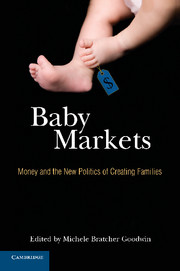Book contents
- Frontmatter
- Contents
- Preface
- Acknowledgments
- Introduction
- PART ONE WHAT MAKES A MARKET? EFFICIENCY, ACCOUNTABILITY, AND RELIABILITY OR GETTING THE BABIES WE WANT
- 1 Baby Markets
- 2 The Upside of Baby Markets
- 3 Price and Pretense in the Baby Market
- 4 Bringing Feminist Fundamentalism to U.S. Baby Markets
- 5 Producing Kinship through the Marketplaces of Transnational Adoption
- PART TWO SPACE AND PLACE: REPRODUCING AND REFRAMING SOCIAL NORMS OF RACE, CLASS, GENDER, AND OTHERNESS
- PART THREE SPECTRUMS AND DISCOURSES: RIGHTS, REGULATIONS, AND CHOICE
- PART FOUR THE ETHICS OF BABY AND EMBRYO MARKETS
- PART FIVE TENUOUS GROUNDS AND BABY TABOOS
- Author Bios
- Index
- References
3 - Price and Pretense in the Baby Market
Published online by Cambridge University Press: 05 August 2012
- Frontmatter
- Contents
- Preface
- Acknowledgments
- Introduction
- PART ONE WHAT MAKES A MARKET? EFFICIENCY, ACCOUNTABILITY, AND RELIABILITY OR GETTING THE BABIES WE WANT
- 1 Baby Markets
- 2 The Upside of Baby Markets
- 3 Price and Pretense in the Baby Market
- 4 Bringing Feminist Fundamentalism to U.S. Baby Markets
- 5 Producing Kinship through the Marketplaces of Transnational Adoption
- PART TWO SPACE AND PLACE: REPRODUCING AND REFRAMING SOCIAL NORMS OF RACE, CLASS, GENDER, AND OTHERNESS
- PART THREE SPECTRUMS AND DISCOURSES: RIGHTS, REGULATIONS, AND CHOICE
- PART FOUR THE ETHICS OF BABY AND EMBRYO MARKETS
- PART FIVE TENUOUS GROUNDS AND BABY TABOOS
- Author Bios
- Index
- References
Summary
Few proposals generate the moral outrage engendered by a suggestion that babies – or, more accurately, but less vividly, parental rights – should be traded on the open market. More than anything else, baby selling seems to fly in the face of our deeply held convictions that some items are too priceless to ever be bought and sold. Throughout the world, in fact, baby selling is formally prohibited. And throughout the world, babies are bought and sold each day. As demonstrated in this chapter, the legal baby trade is a global market in which prospective parents pay, scores of intermediaries profit, and the demand for children is clearly differentiated by age, race, special needs, and other consumer preferences, with prices ranging from zero to more than one hundred thousand dollars.
Yet legal regimes and policy makers around the world pretend that the baby market does not exist, most notably through proscriptions against so-called baby selling – typically defined as a prohibition against the relinquishment of parental rights in exchange for compensation. As a result, fees, donations, and reimbursements take the place of purchase prices. Although large sums of money change hands and many market intermediaries profit handsomely from the baby trade, compensation to some of society's most vulnerable suppliers is legally restricted, and despite the successful addition of new sources of supply, the number of available so-called desirable children continues to fall far short of demand.
- Type
- Chapter
- Information
- Baby MarketsMoney and the New Politics of Creating Families, pp. 41 - 55Publisher: Cambridge University PressPrint publication year: 2010
References
- 5
- Cited by

